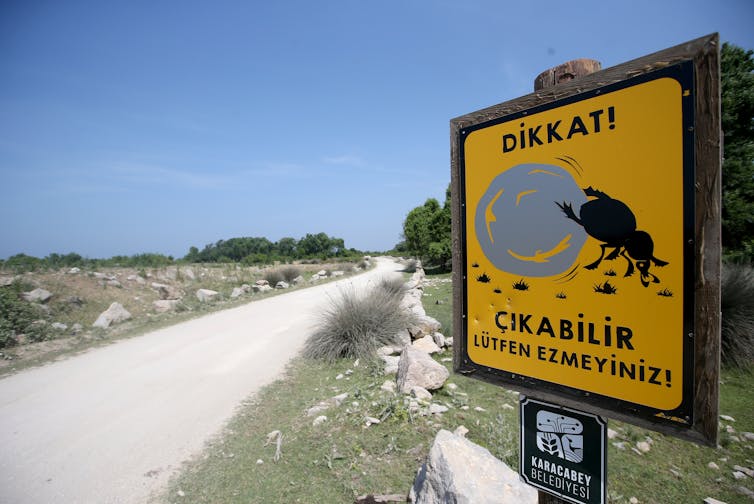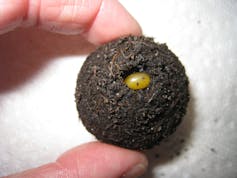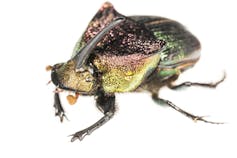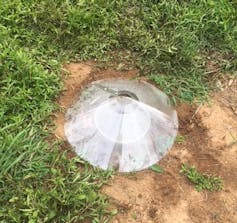Investigating New Digital Authorities
In the years since social media became part of our daily lives, an increased number of individuals are self-organizing online around identity, social topics, and various other interests. This transition leads to a new type of cultural authority and one that researchers are investigating to understand how the online human world interacts with the offline human world at both the individual and collective level.

“I’ve always been puzzled by how presumably reasonable people can come up with completely different strong beliefs or understandings about the same events or processes that happened or are happening in different situations affecting their personal life or our society,” Gavrilets said. “Over the last couple of years, with the 2020 elections and COVID, these differences have become particularly striking and their real and potential consequences particularly dangerous.”
The big question he wants to answer? “How are contemporary social media changing human social and cultural evolution?”
Understanding How New Authorities Develop
Gavrilets and colleague Neil Johnson from the George Washington University will leverage recent work on online behaviors to build a new understanding of how these new authorities develop and function. They will look at how these new authorities contribute to cultural polarizations and how their efforts and impacts are influenced.
“We will study the emergence of self-organized groups spouting extremism, hate, and vaccine hesitancy within and across social media platforms,” Gavrilets said. “We will look at their structure and try to understand how its composition defines who listens and how these new identity groups emerge.”
Gavrilets, a mathematical biologist whose work focuses on human social behavior, will borrow ideas and theoretical tools from ecology and evolutionary biology and apply them to human social behaviors online.
“This work will not only help us to understand online human social behaviors better, but also how our attitudes and beliefs are shaped,” said Gavrilets, who also is the director of the Center for the Dynamics of Social Complexity at UT.
“Misinformation about science, climate change, vaccination, COVID, and political processes and events has a potential to affect the life, prosperity, and wellbeing of everyone in a negative way,” Gavrilets said. “By understanding how new social and cultural authorities are formed online, we can develop better policies for governments and businesses to counter misinformation and simultaneously promote public understanding of science-based policies aiming to improve our life and prosperity.”
To learn more, read the full project summary online.
About the John Templeton Foundation
Founded in 1987, the John Templeton Foundation supports research and catalyzes conversations that inspire people with awe and wonder. They fund work on subjects ranging from black holes and evolution to creativity, forgiveness, and free will. They also encourage civil, informed dialogue among scientists, philosophers, theologians, and the public at large. Their aspiration is to help people create lives of meaning and purpose and to become a global catalyst for discoveries that contribute to human flourishing.
With an endowment of $3.8 billion and annual giving of approximately $140 million, the Foundation ranks among the 25 largest grantmaking foundations in the United States. Headquartered outside Philadelphia, their philanthropic activities have engaged all major faith traditions and extended to more than 57 countries around the world.
Ecology Professor Receives NSF Grant to Research Global Change Affecting Ecosystems

Kivlin and her colleague Kalisz, EEB professor, received $2.33 million of the grant, while Smith, assistant professor in Department of Biological Sciences at Texas Tech University, received the remaining funding.
The five-year study will allow Kivlin and her colleagues to research the symbiotic relationships between plants and fungi and how global changes, including invasive species, affect them.
“Our current collaborative NSF integrative biology grant will investigate how invasive plants disrupt native plant and mycorrhizal fungal associations from small-scale nutrient fluxes to native plant health, composition, and ecosystem carbon and nutrient cycles,” Kivlin said.
The project builds off decades of Kalisz’s NSF-funded long-term research in environmental biology studies at the Trillium Trail in Pittsburgh that focused on the effects of the presence of garlic mustard, a highly invasive plant species, on native plant species.
“Plant invasions are one of the largest impacts of human land-use across Earth, but the effects of invasions on belowground processes have largely been unexplored. Our project will unearth these hidden effects so society can be better prepared to mitigate detrimental effects on native plants in the future,” Kivlin said.
There is not currently enough information about how interactions between plants and fungi respond to climate and land-use change because these interactions tend to be hidden and widely dispersed.
“Fundamental knowledge from our work will determine how global change will disrupt interactions among organisms in natural ecosystems. Many plants and animals, like humans, rely on their microbiome to survive and thus, it is crucial that we understand how these interactions will perform under future conditions,” Kivlin said.
Undergraduate students in underrepresented groups from rural Appalachia who otherwise would not have the opportunity to engage in research will be given the chance to do so. Students will conduct laboratory experiments at UT and will partake in field experiments in Pittsburgh.
–Story by Jessica Foshee
In Their Own Words: Daniel Simberloff
In Their Own Words: Daniel Simberloff https://academic.oup.com/bioscience/article/72/10/945/6612801#no-access-message
Dung beetle mothers protect their offspring from a warming world by digging deeper

Ugur Ulu/Anadolu Agency via Getty Images
Kimberly S. Sheldon, University of Tennessee
If the TV series “Dirty Jobs” covered animals as well as humans, it would probably start with dung beetles. These hardworking critters are among the insect world’s most important recyclers. They eat and bury manure from many other species, recycling nutrients and improving soil as they go.
Dung beetles are found on every continent except Antarctica, in forests, grasslands, prairies and deserts. And now, like many other species, they are coping with the effects of climate change.
I am an ecologist who has spent nearly 20 years studying dung beetles. My research spans tropical and temperate ecosystems, and focuses on how these beneficial animals respond to temperature changes.
Insects don’t use internally generated heat to maintain their body temperature. Adults can take actions such as moving to warmer or colder areas. However, earlier life stages such as larvae are often less mobile, so they can be strongly affected by changing temperatures.
But dung beetles appear to have a defense: I have found that adult dung beetles modify their nesting behaviors in response to temperature changes by burying their brood balls deeper in the soil, which protects their developing offspring.
Champion recyclers
It’s easy to joke about these busy insects, but by collecting and burying manure, dung beetles provide many ecological benefits. They recycle nutrients, aerate soil, lessen greenhouse gas emissions from cattle farming and reduce pest and parasite populations that harm livestock.
Dung beetles are also important secondary seed dispersers. Dung from other animals, such as bears and monkeys, contains seeds that the beetles bury underground. This protects the seeds from being eaten, makes them more likely to germinate and improves plant growth.
There are roughly 6,000 species of dung beetles around the world. Most feed exclusively on dung, though some will feed on dead animals, decaying fruit and fungi.
Some species use stars and even the Milky Way to navigate along straight paths. One species, the bull-headed dung beetle (Onthophagus taurus), is the world’s strongest insect, able to pull over 1,000 times its own body weight.
That strength comes in handy for dung beetles’ best-known behavior: gathering manure.
Rolling and tunneling
Most popular images of dung beetles show them collecting manure and rolling it into balls to spirit away. In fact, some species are rollers and others are tunnelers that dig into the ground under a dung pat, bring dung down into the tunnel and pack it into a clump or sphere, called a brood ball. The female then lays an egg in each brood ball and backfills the tunnel with soil. Rollers do the same once they get their dung ball safely away from the competition.

Kimberly Sheldon, CC BY-ND
When the egg hatches, the larva feeds on dung from the brood ball, pupates and emerges as an adult. It thus goes through complete metamorphosis – from egg to larva to pupa to adult – inside the brood ball.
Warmer temperatures produce smaller beetles
Dung beetle parents don’t provide care for their offspring, but their nesting behaviors affect the next generation. If a female places a brood ball deeper underground, the larva in the brood ball experiences cooler, less variable temperatures than it would nearer the surface.
This matters because temperatures during development can affect offspring survival and other traits, such as adult body size. If temperatures are too hot, offspring perish. Below that point, warmer, more variable temperatures lead to smaller-bodied beetles, which can affect the next generation’s reproductive success.
Smaller males can’t compete as well as larger males, and smaller females have lower reproductive output than larger females. In addition, smaller-bodied beetles remove less dung, so they provide fewer benefits to humans and ecosystems, such as nutrient cycling.
Beetles in the greenhouse
Climate change is making temperatures more variable in many parts of the world. This means that insects and other species have to handle not just warmer temperatures, but greater changes in temperature day to day.
To examine how adult dung beetles responded to the types of temperature shifts associated with climate change, I designed cone-shaped mini-greenhouses that would fit over 7-gallon buckets buried in the ground to their brims. Will Kirkpatrick, an undergraduate student in my lab, led the field trials.
We randomly placed a fertilized female rainbow scarab, Phanaeus vindex, in each greenhouse bucket and in the same number of uncovered buckets to serve as controls. Using temperature data loggers placed at four depths in the buckets, we verified that soil temperatures in “greenhouse” buckets were warmer and more variable than soil temperatures in uncovered buckets.

Dan Mele, CC BY-ND
We gave the beetles fresh cow dung every other day for 10 days and allowed them to make brood balls. Then we carefully dug through the buckets and recorded the number, depth and size of brood balls in each bucket.
Digging deeper
We found that beetle mothers in greenhouse environments created more brood balls overall, that these brood balls were smaller, and that these females buried their brood balls deeper in the soil than beetle mothers in control buckets. Brood balls in the greenhouses still ended up in areas that were slightly warmer than those in the control buckets – but not nearly as warm as if the beetle mothers had not altered their nesting behaviors.

Kimberly Sheldon, CC BY-ND
However, by digging deeper, the adults fully compensated for temperature variation. There was no difference in the temperature variation experienced by brood balls in greenhouse buckets and control buckets. This reflects the fact that soil temperatures become increasingly stable with depth as the soil becomes more and more insulated from the changing air temperatures above it.
Our findings also hint at a possible trade-off between burial depth and brood ball size. Beetle mothers that dug deeper protected their offspring from temperature changes but provided less dung in their brood balls. This meant less nutrition for developing offspring.
Climate change could still affect adult dung beetles in ways we did not test, with consequences for the next generation. In future work, we plan to place brood balls of Phanaeus vindex and other species of dung beetles back into the greenhouse and control buckets at the depths at which they were buried so that we can see how the beetle offspring develop and survive.
So far, though, my colleagues and are encouraged to find that these industrious beetles can alter their behavior in ways that may help them survive in a changing world.
Kimberly S. Sheldon, Associate Professor of Ecology and Evolutionary Biology, University of Tennessee
This article is republished from The Conversation under a Creative Commons license. Read the original article.
- « Previous Page
- 1
- …
- 5
- 6
- 7
- 8
- 9
- …
- 46
- Next Page »